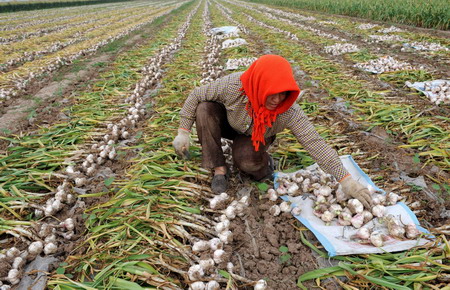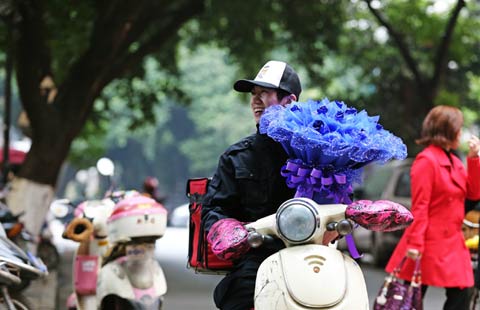S. Korean move leaves Chinese garlic farmers fuming
By Zhong Nan and Zhao Ruixue (China Daily) Updated: 2015-02-03 08:09
 |
|
File photo shows a garlic farmer works her land in Jinxiang county of East China's Shandong province on June 1, 2010. [Photo/Xinhua] |
With a total loss of more than 10 million yuan ($1.59 million), what the exporters and farmers could not accept are the inconsistent excuses given by South Korea. The country's Agro-Fisheries Trade Corp had given a quality inspection certificate before the delivery of the product. However, after the first batch of products arrived in Busan in December, the country's agriculture department said the products were unqualified.
Due to lack of funds, the garlic was left at Busan port for several days before the Lanling county government helped Chinese exporters and farmers secure bank loans to ship the 110 containers of garlic back to China.
To prevent further losses, the local government has submitted rights protection materials to South Korea's consulate in Qingdao. The Chinese embassy in South Korea and the provincial commerce department of Shandong have also taken up the issue.
Chinese garlic farmers have complained to the Ministry of Commerce about the unfair treatment. The returned garlic has been transported to the province's Jining Port.
Song said he has sold a quarter of his 600 metric tons of garlic after the shipment returned to the province, and the local government will lodge a law suit against South Korea's Agro-Fisheries Trade Corp.
Li Houfu, another Lanling-based exporter, said South Korean government officials came to Shandong province in 2014 to invite bids to supply garlic. Li and other farmers from his county made the bids together.
"I supplied 1,000 tons of quality garlic, which cost 5,650 yuan per ton to purchase. On top of that, I forked out more than 900,000 yuan in site rental costs and 870,000 yuan of maritime transportation costs," said Li.
"We paid 8 yuan for a kilogram of garlic, but the garlic that's been shipped back only sells for 2.18 yuan. It is too heavy a loss to bear."
- S. Korean move leaves Chinese garlic farmers fuming
- There's more to Anbang story than just meets the eye
- GDP: How far can it fall?
- Top 10 outbound M&A deals by Chinese companies 2014
- Minsheng stocks hit as ex-president investigated
- 5G to become available by 2020: Ericsson
- Chinese stocks down for fifth day
- 'New normal' brings new opportunity for low-carbon economy
















